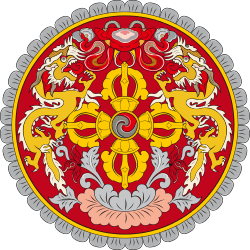Dratshang Lhentshog
The Dratshang Lhentshog (Dzongkha: གྲྭ་ཚང་ལྷན་ཚོགས་; Wylie: grwa-tshang lhan-tshogs) is the Commission for the Monastic Affairs of Bhutan.[1] Under the 2008 Constitution, it is the bureaucracy that oversees the Drukpa Kagyu sect that is the state religion of Bhutan. Although Bhutan has a state religion, the role of the religious bureaucracy ideally complements secular institutions within a dual system of government.
 |
|---|
| This article is part of a series on the politics and government of Bhutan |
|
Monarchy |
|
Government |
Composition and function
Under the 2008 Constitution, the Dratshang Lhentshog is made up of seven members: the Je Khenpo as Chairman; the Five Lopons (Dzongkha: སློབ་དཔོན་ལྔ་; Wylie: slob-dpon lnga) of the Zhung Dratshang (Dzongkha: གཞུང་གྲྭ་ཚང་; Wylie: gzhung grwa-tshang; "Central Monastic Body"[1]); and a civil servant Secretary.[2] Under the 2008 Constitution, it is mandated that the Zhung Dratshang and rabdeys (monastic bodies in dzongs other than Punakha and Thimphu)[1] receive state funding and facilities adequate to support the Drukpa Kagyu sect.[2]
The Five Lopons recommend a learned and respected monk ordained in accordance with the Druk-lu, having the nine qualities of a spiritual master, and being accomplished in ked-dzog (spiritual development and completion),[3] to the King of Bhutan. The King then appoints that monk to the office of Je Khenpo.[2] In turn, the Lopons are appointed on the same criteria by the Je Khenpo on the advice of the remaining members of the Dratshang Lhentshog.[2]
The sitting Je Khenpo is the formal leader of the southern branch of the Drukpa Kagyu sect, which is part of the Kagyu tradition of Himalayan Buddhism. The primary duty of the Je Khenpo is to lead the Dratshang Lhentshog and to arbitrate on matters of doctrine, assisted by the Five Lopons.[4] The Je Khenpo is also responsible for many important liturgical and religious duties across the country. Aside from the King of Bhutan, only the Je Khenpo may don a saffron kabney.[5]
References
- "Constitution of the Kingdom of Bhutan (English) – Glossary" (PDF). Government of Bhutan. 2008-07-18. Archived from the original (PDF) on 2011-07-06. Retrieved 2010-10-13.
- "Constitution of the Kingdom of Bhutan (English) – Article 3" (PDF). Government of Bhutan. 2008-07-18. Archived from the original (PDF) on 2011-07-06. Retrieved 2010-12-17.
- "Tibetan-English-Dictionary of Buddhist Teaching & Practice". Diamond Way Buddhism Worldwide. Rangjung Yeshe Translations & Publications. 1996. Archived from the original on 2010-03-28. Retrieved 2010-12-17.
- Worden, Robert L.; Savada, Andrea Matles (ed.) (1991). "Chapter 6 - Bhutan: Religious Tradition". Nepal and Bhutan: Country Studies (3rd ed.). Federal Research Division, United States Library of Congress. ISBN 0-8444-0777-1. Retrieved 2010-12-17.CS1 maint: extra text: authors list (link)
- Worden, Robert L.; Savada, Andrea Matles (ed.) (1991). "Chapter 6 - Bhutan: Social System". Nepal and Bhutan: Country Studies (3rd ed.). Federal Research Division, United States Library of Congress. ISBN 0-8444-0777-1. Retrieved 2010-12-17.CS1 maint: extra text: authors list (link)
External links
- "The Constitution of the Kingdom of Bhutan" (PDF). Government of Bhutan. 2008-07-18. Archived from the original (PDF) on 2011-07-06. Retrieved 2010-10-08.
- "༄༅།།འབྲུག་གི་རྩ་ཁྲིམས་ཆེན་མོ།།" [The Constitution of the Kingdom of Bhutan] (PDF) (in Dzongkha). Government of Bhutan. 2008-07-18. Archived from the original (PDF) on 2011-07-06. Retrieved 2010-10-19.